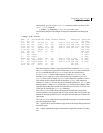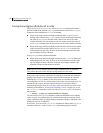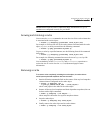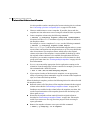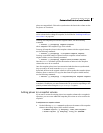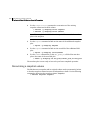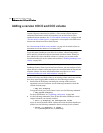
350 Administering volume snapshots
Creating traditional third-mirror break-off snapshots
It is also possible to make a snapshot plex from an existing plex in a volume.
See “Converting a plex into a snapshot plex” on page 351 for details.
2 Choose a suitable time to create a snapshot. If possible, plan to take the
snapshot at a time when users are accessing the volume as little as possible.
3 Create a snapshot volume using the following command:
# vxassist [-g diskgroup] snapshot [nmirror=N] volume snapshot
If required, use the nmirror attribute to specify the number of mirrors in
the snapshot volume.
For example, to create a snapshot of voldef, use the following command:
# vxassist [-g diskgroup] snapshot voldef snapvol
The vxassist snapshot task detaches the finished snapshot mirror, creates
a new volume, and attaches the snapshot mirror to it. This step should only
take a few minutes. The snapshot volume, which reflects the original
volume at the time of the snapshot, is now available for backing up, while
the original volume continues to be available for applications and users.
If required, you can make snapshot volumes for several volumes in a disk
group at the same time. See “Creating multiple snapshots” on page 352 for
more information.
4 Use fsck (or some utility appropriate for the application running on the
volume) to clean the temporary volume’s contents. For example, you can use
this command with a VxFS file system:
# fsck -F vxfs /dev/vx/rdsk/diskgroup/snapshot
5 If you require a backup of the data in the snapshot, use an appropriate
utility or operating system command to copy the contents of the snapshot to
tape, or to some other backup medium.
When the backup is complete, you have the following choices for what to do with
the snapshot volume:
■ Reattach some or all of the plexes of the snapshot volume with the original
volume as described in “Reattaching a snapshot volume” on page 352. If
FastResync was enabled on the volume before the snapshot was taken, this
speeds resynchronization of the snapshot plexes before the backup cycle
starts again at step 3.
■ Dissociate the snapshot volume entirely from the original volume as
described in “Dissociating a snapshot volume” on page 354. This may be
useful if you want to use the copy for other purposes such as testing or
report generation.
■ Remove the snapshot volume to save space with this command:
# vxedit [-g diskgroup] -rf rm snapshot




